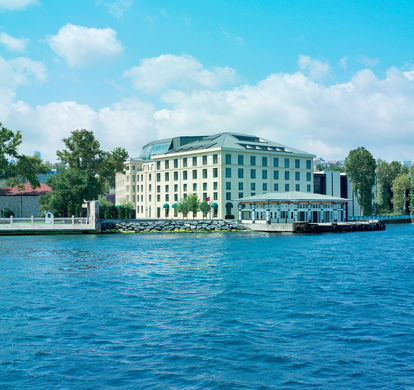Buy or gift a stand-alone digital subscription and get unlimited access to dozens of back issues for just £18.99 / $18.99 a year.
Please register at www.exacteditions.com/digital/cornucopia with your subscriber account number or contact subscriptions@cornucopia.net
Buy a digital subscription Go to the Digital EditionThe Istanbul diaries of Gertrude Bell, now available online, reveal her astonishing transformation from socialite to scholar and political observer. By Robert Ousterhout
For the Western traveller of a century ago, Constantinople represented an exotic destination – indeed, one of the most exotic: legendary entrepôt of the East, capital of the declining Ottoman Empire, city of sultans and potentates, with vestiges of past civilisations faintly visible through a crumbling Oriental veneer.
The intrepid British explorer Gertrude Bell viewed the city quite differently. For her, rather than a destination per se, Constantinople usually marked the end of a journey and a return to civilisation, society and decorum after months of exploration off the beaten track, considerably farther to the east. Having dispensed with her pack animals and assistants at a convenient Anatolian railway station – usually Konya or Eskişehir – she would take the train to Constantinople, check into the best hotel, take a bath and dress for dinner.
When Gertrude Bell arrived in the city on May 20, 1905, she commented: “Queer feeling of coming into the centre of the web of which I had been testing the meshes and to the high-water mark of all the ebbs and flows of civilisation I have seen.” For the preceding months she had been travelling by camel and on horseback through Syria, breaking new barriers in desert exploration, finally crossing the highlands of Anatolia to end her journey on the train from Eskişehir. She arrived at sunset at Haydarpaşa station, where she was met by a kavass, or armed guard, from the British embassy, with letters from her father. She headed directly for the Pera Palace but, finding it full, settled for the Continental – most of the time she never bothered with reservations but would just show up. Her next days were a social whirl, as she tracked down friends, saw various officials and consulted scholars. She attempted in vain to see Osman Hamdi Bey at the Archaeology Museum, which he had founded, and instead visited Byzantine monuments in the company of the noted Byzantinist Professor Alexander Van Millingen of Robert College and Sir Edward John Poynter, president of the Royal Academy and director of the National Gallery in London.
Such was the life of Gertrude Bell, who made the transition from socialite to desert explorer to research scholar with remarkable dexterity. Born in 1868 into the family of a wealthy industrialist, she bristled with intelligence and impatience throughout her life. She never married and never had to worry about an income, and so spent much of her adult life setting herself stiff challenges. She travelled around the world twice, excelled as an alpinist, and explored the deserts of Syria and Arabia. Educated in modern history at Oxford, she learned Persian in Tehran and Arabic in Jerusalem and taught herself archaeology along the way. She put this to use, first in 1907 at the early Christian settlement known as Binbirkilise (now in central Turkey), and subsequently at the churches and monasteries of the Tur Abdin (now in southeast Turkey) in 1909, and the early Abbassid palace at Ukhaidir (now in northern Iraq) in 1911. By the outbreak of the First World War in 1914, her interests had shifted to politics and diplomacy, in particular the fate of the Arab provinces with the disintegration of the Ottoman Empire.
Bell’s Istanbul diary entries mark her transformation as a scholar and cultural observer, as well as her increasing political awareness.
Gertrude Bell’s diaries, letters and photographs may be accessed online courtesy of the University of Newcastle Library at www.gerty.ncl.ac.uk
The best table grapes in Istanbul are the fragrant, delicate skinned çavuş from the northern Aegean island of Bozcaada, ancient Tenedos, and the sweet sultaniye grapes from around Izmir.
Maggie Quigley-Pınar describes a book of photographs that evoke the spirit an almost-forgotten modern era: Istanbul in the 1970s
John Carswell pays tribute to his friend Honor Frost, doyenne of underwater archaeology
James Crow on Istanbul’s amazing system of aqueducts
The landmark 2012 exhibition at the Tokpapı Palace, and the sumptuous book that accompanied it.
They were stigmatised and despised, and eventually they were closed down. But what would Turkey be today without the Village Institutes, its bravest educational revolution, and the young people they empowered? Maureen Freely tells the moving story of the institutes, the subject of a new book and exhibition
The lethal mischief of Canon MacColl, by David Barchard
As Turkey and the Netherlands celebrate 400 years of diplomatic relations, Henk Boom highlights the twenty turbulent years that Frederik Gijsbert, Baron van Dedem spent as ambassador to Constantinople
Simple on the outside, some wooden village mosques had an added portico reminiscent of galleries opening onto the courtyards of private houses in the region. Inside, pillared halls and colourful painting on the wooden structure and on the walls make for a warm, joyful space. Photographs by Tarkan Kutlu
Abdülhamid I and Osman III’s private quarters in the Topkapı. Photographed by Fritz von der Schulenburg
Sagalassos, the remote site in southern Turkey where a giant statue of Emperor Hadrian was discovered five years ago, is the driving passion of Marc Waelkens. The Belgian archaeologist, whose new book is now available from Cornucopia, talks to Thomas Roueché about his pioneering work as director of excavations


Cornucopia works in partnership with the digital publishing platform Exact Editions to offer individual and institutional subscribers unlimited access to a searchable archive of fascinating back issues and every newly published issue. The digital edition of Cornucopia is available cross-platform on web, iOS and Android and offers a comprehensive search function, allowing the title’s cultural content to be delved into at the touch of a button.
Digital Subscription: £18.99 / $18.99 (1 year)
Subscribe now